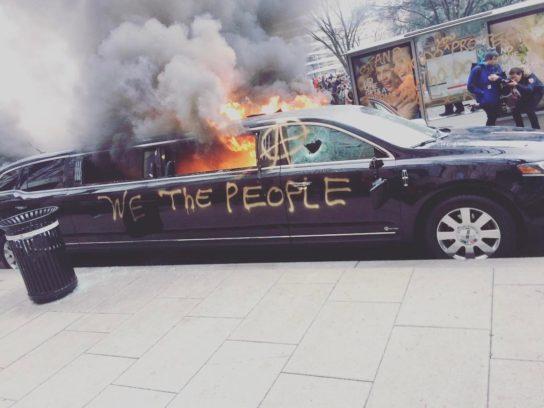

On January 20, 2017, tens of thousands of people greeted President Donald Trump’s inauguration with large protests ranging from creative blockades to militant street actions. Among the demonstrations that day was an “anti-capitalist and anti-fascist bloc” led with banners reading “No Peaceful Transition” and “Make Racists Afraid Again”. In response to the protest, police violently attacked and encircled nearly ~230 people, arresting them for allegedly committing or being in the proximity of property damage.
After a series of indictments and legal maneuvering, around 200 people were ultimately charged with six felonies (5 counts of property destruction and inciting a riot) and two misdemeanors (engaging in a riot and conspiracy to riot) each. This means that each of these people are facing 61 years in prison.
This unprecedented case is important because it is an attempt by the
United States government to clamp down on the disruptive protests that
spontaneously occurred in response to Trump’s election. The charges are
intended to stifle active resistance and to send the message that
resistance will not be tolerated at a time when it is needed more than
ever. In many ways, the case is an experiment in expanding the
repressive powers of the state, with prosecutors seeking to charge
everyone as a group for the same handful of broken windows based merely
on presence. Moreover, the police and other state actors are trying to
redefine basic political organizing — holding meetings, planning
protests, and marching as a group — as an act of conspiracy. This is
part of an ongoing trend on both the national and international level of
escalating repression directed at social movements in so-called
“democratic” states. If the United States is successful in prosecuting
social movements in this way, it will likely encourage other governments
to do the same.
As the Trump administration brings the world to the brink of disaster on an almost daily basis, it is important to stand with those in the United States who risked their freedom to oppose him from his first day in office. The Inauguration Day protests set the tone for much of resistance that would come and affirmed that the Trump administration and its far right allies would not be unopposed. Subsequently, people around the country used direct action to shut down nearly every international airport in the country in a historic protest that temporarily halted the new government’s anti-immigrant and islamophobic policies. Continuing this struggle into the courtroom, the majority of the defendants are working together to respond politically to these charges and are using this case as a way to build connections between different places and different struggles.
In response, this is a call for an international day of solidarity on
January 20, 2018. Solidarity actions from around the world have warmed
the hearts of defendants at a time when they are facing intense
repression. Moreover, they are part of a political praxis that
recognizes we are engaged in a shared struggle that transcends borders.
We ask for solidarity not as an act of charity, but as a gesture towards
shared complicity in the effort to resist the Trump administration and
the future it seeks to impose.
Catalan l German l Portuguese l Spanish
(via Contra Info)
X
Länk: https://en-contrainfo.espiv.net/2018/01/01/usa-j20-solidarity-call-out/